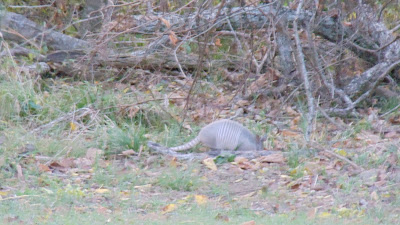You know you’re not in Kansas anymore (or Utah, Nebraska, Iowa, Ohio, Kentucky or most of the 13 states we’ve been in since we left Salt Lake City August 2) when you see a dead armadillo at the side of the road.
Then, when I called a destination to double check directions, I was told to drive “one mile past the nuclear plant.” When we got there, we had a lady bug infestation. Big lady bugs --- maybe due to nuclear mutation? And our campsite neighbor told us to watch out for the timber rattlers.
The destination? Grand Gulf Military Park near Port Gibson, Mississippi, about 30 miles south of Vicksburg and half a mile from the Mississippi River. Actually, of all the southern states I’ve been in so far, I like Mississippi the best. The weather’s been balmy; we’re seeing our first Spanish moss; the people are friendly. And the roads are good -- you notice that in an RV. Jim says he likes Arkansas the best, based on the fact that he could see himself staying at Lake Chicot a while. Granted, our opinions are based on the small slices of states. I spoke with a fellow camper here, for example, who told me she'd been to Utah and it was “just rocks and dirt.” So not true.



















